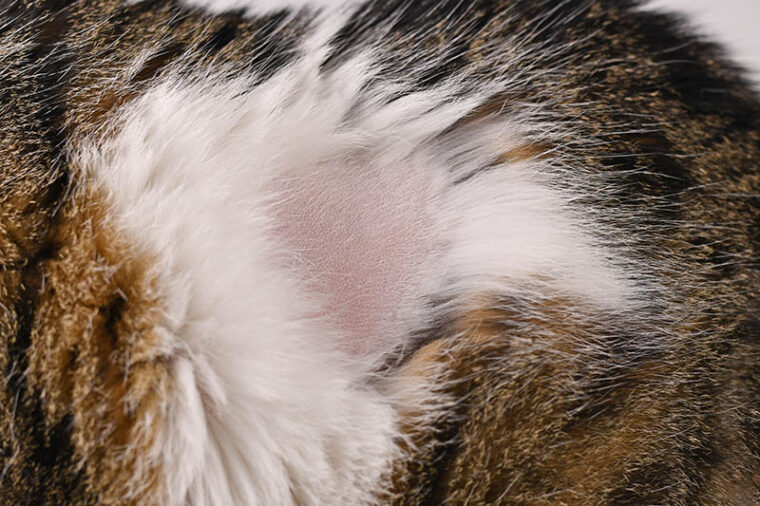
You may start to notice that your cats’ hair seems thin in certain areas of the body. This thinning hair may then progress to complete alopecia, or lack of hair. Certain conditions that cause hair loss may be itchy, and your cat may be constantly chewing and/or biting at these alopecic areas. Others times the hair just seems to be falling out. There are many different causes to hair loss in a cat from fleas, allergies, stress and infections. We’ll discuss what each of these causes are and if you should be worried.

What Are Some Causes of Hair Loss in My Cat
1. Fleas
In veterinary medicine, we often prescribe flea and tick preventatives. This means the medications are either applied or given orally to help prevent infestation, irritation and infection caused by fleas and/or ticks. Many people believe that their cat cannot contract fleas because they are indoor only. This is completely false. While it’s true that outdoor cats are more prone to flea infestations, indoor cats can also become affected. All cats, no matter where they live, should be on regular, veterinary-prescribed flea prevention.
2. Allergies
Allergies in cats can be difficult to appreciate and/or diagnose. Allergies in dogs and cats will cause itchy, or pruritic skin. This will cause the affected cat to lick, chew or bite themselves excessively due to the itchiness. Because cats regularly groom themselves, you may not notice anything out of the ordinary until your cat starts to lose massive amounts of hair. It may be then that you notice your cat has been licking or grooming themselves more than usual.
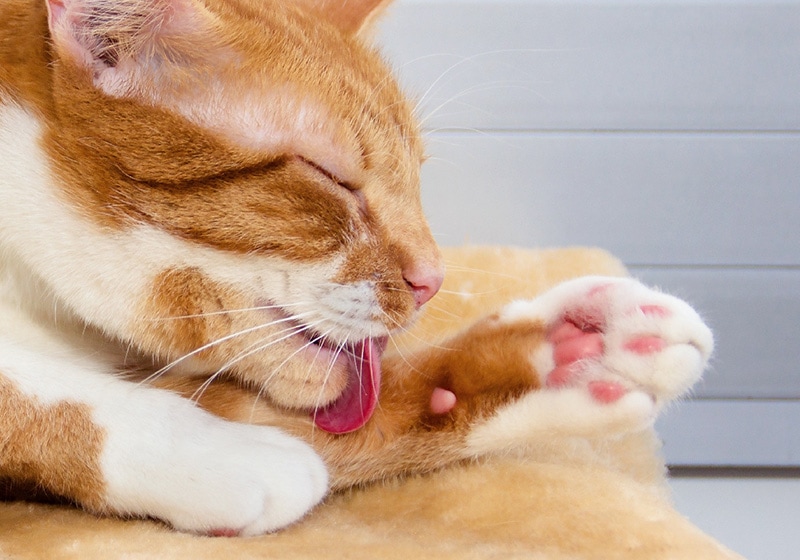
3. Stress/Anxiety
As with allergies, you may not notice that your cat is grooming themselves excessively until their hair is gone. When a cat is stressed and/or anxious, they may start to lick, chew or groom themselves or even physically pull out their hair. This condition is not pruritic or itchy as with allergies, but can have a very similar appearance.
4. Infection
In cats, we can see bacterial or yeast skin infections called pyoderma. We can also see fungal infections, more commonly known as ringworm. All of these infections can commonly cause hair loss in the affected area(s).
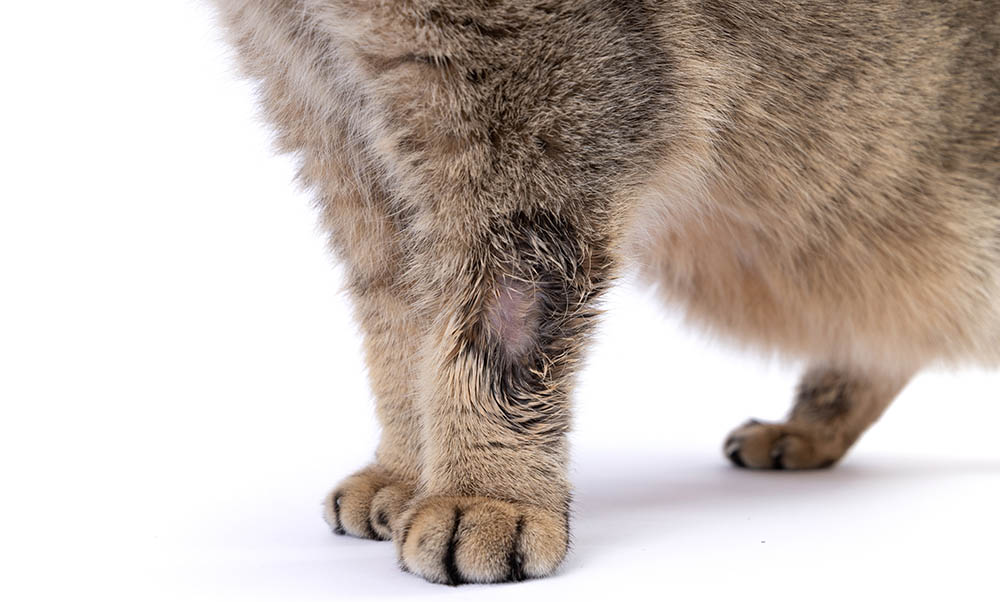

What Does This Hair Loss Look Like
1. Fleas
If your cat is losing hair because of fleas, you may or may not notice fleas. It’s important to remember that the absence of seeing fleas does not mean your cat doesn’t have them! Most frequently, cats will be itchy around their necks, tail base area and back leg /thigh areas. You may notice your cat itching, scratching, biting or chewing at these areas that will eventually lose hair. The skin underneath may have excoriations or scratches from your cat irritating their skin. You may notice small black dots on the skin or stuck within the fur that is actually flea dirt – or flea poop.
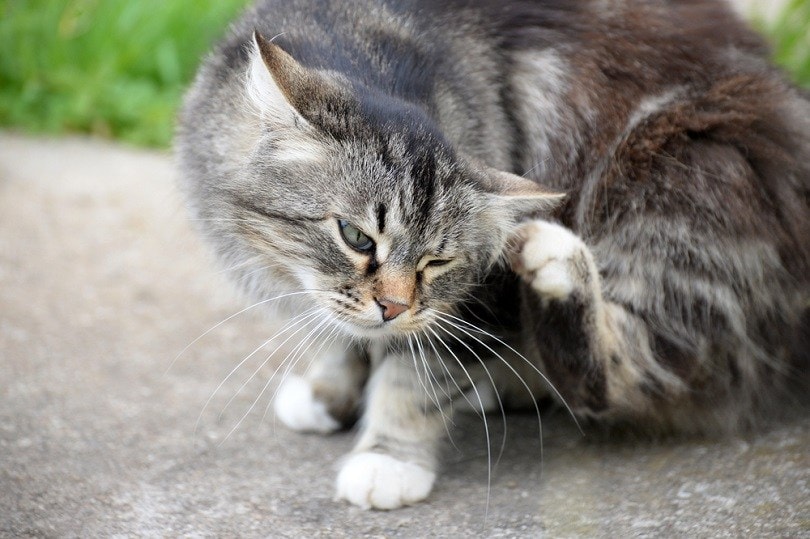
2. Allergies
This type of hair loss will occur over time as your cat excessively grooms the itchy areas. Cats will often get significant itching of the face and neck. They will obsessively rub their face and neck on the rug, furniture or their paws. Think of when you have a mosquito bite how itchy and irritated that area becomes. This may be what your cat feels – that constant, nagging pruritus. The more your cat itches, the more inflamed and irritated the area(s) become, causing your cat to itch even more. While the head, neck and face are the most common areas that become itchy with allergies, any area of the body can be pruritic.
3. Stress/Anxiety
This cause will also manifest as obsessive overgrooming. Unlike allergies, this most commonly occurs on your cat’s belly, groin and inner thigh area(s). You may notice your cat constantly grooming their belly, or even physically pulling out their hair with the mouth and/or paws. You may not notice anything unusual until your cat has a huge bald patch on the belly and/or underside. This cause is not itchy.
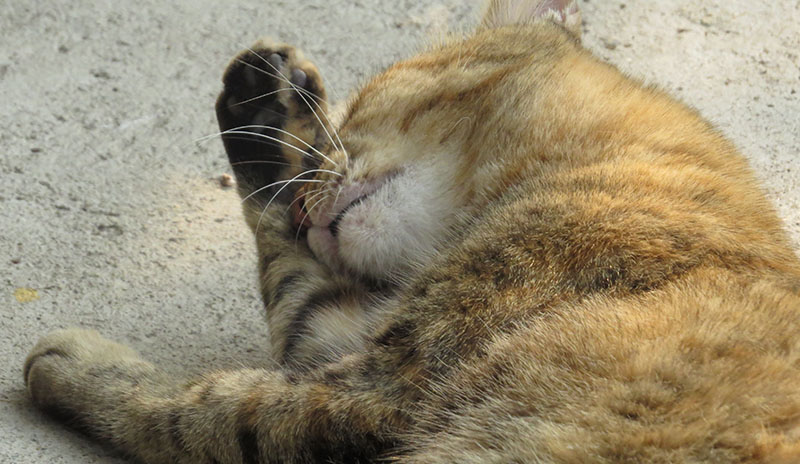
4. Infection
If your cat has been excessively scratching and/or overgrooming themselves from any of the above reasons, the natural bacteria in their mouth and skin may cause an infection. This may appear as crusting, pimples and/or pustules and flaky skin. The infected areas of the skin may then secondarily lose their hair. Or, you may notice that when you pull a crust off, the hair comes with it.
With fungal infections, or ringworm, there is typically a circular area of reddened crusts with hair loss in the middle of the circle. It can appear very similar to a bacterial or yeast infection. The main difference with ringworm is that it’s contagious to other animals and people. You, your family members and/or other animals in the house may then develop similar itchy lesions.

Should I Be Worried?
Any of the causes of itching require treatment by a veterinarian. With that said, none of them are emergencies that need to be dealt with the second you notice them. However, you should make an appointment in a timely manner for your cat to see your veterinarian. The longer you allow the condition to go on, the more irritated and miserable your cat will be.
Again, think about the mosquito bite analogy. The more bites you get, the more irritated and inflamed your skin will become, making your more and more uncomfortable. The longer you allow any of the causes of hair loss to go on in your cat, the worse the condition can get, the more uncomfortable they are and the more difficult it can be to treat.
How Will My Cat Be Treated For Hair Loss?
Fleas are a condition that need to be addressed both with your affected cat, and with any other animals in the house. Other animals that may go inside and outside may be tracking the fleas inside, only to have them jump onto your cat and into the home environment to reproduce. In addition to your animals, your house needs to be treated for at least a few months to rid the environment of all flea life cycles. It’s very important that you only treat your cat with veterinary prescribed medications for cats only. Flea preventative for dogs can be toxic and fatal to cats along with many OTC products.
Allergies are a lifelong battle that may be easy and/or difficult to manage. We don’t recommend just giving your cat Benadryl or even just changing their food. Speak with your veterinarian first. They can best discuss a plan of action before a lot of things are changed and nothing gets better. Your veterinarian may prescribe medication for itching, likely put your cat on flea preventatives, and may even recommend a prescription diet. Allergies are complex and can be extremely frustrating to treat.
If your cat is suffering from stress over-grooming, your veterinarian will likely want to take a multi-modal approach to treatment. This means that they will likely go over potential stressors in your environment for your cat, potentially prescribing them anti-anxiolytic medications, pheromones and potentially pain medications. As with allergies, this may be a lifelong battle that will require diligent care and follow-up.
Infections of any type will need appropriate veterinary-prescribed medications to treat. Slathering your cat with OTC ointments, salves and sprays are not recommended as they may be toxic to your cat if they groom/lick themselves. Depending on the type of infection, your veterinarian may administer an injectable long-lasting antibiotic, or send you home with oral medications or medicated wipes.

Conclusion
Hair loss in cats can have a number of causes. Some may be straightforward to treat such as fleas or a bacterial infection. While other causes such as stress over-grooming and/or allergies can be complicated and complex to diagnose and treat. While all of the causes of hair loss should be addressed sooner rather than later, you don’t need to rush out in the middle of the night and get emergency care for your cat. A scheduled appointment and regular follow-ups with your veterinarian will hopefully help to get your cat’s condition treated and their hair growing back.
Featured Image Credit: Firn, Shutterstock




